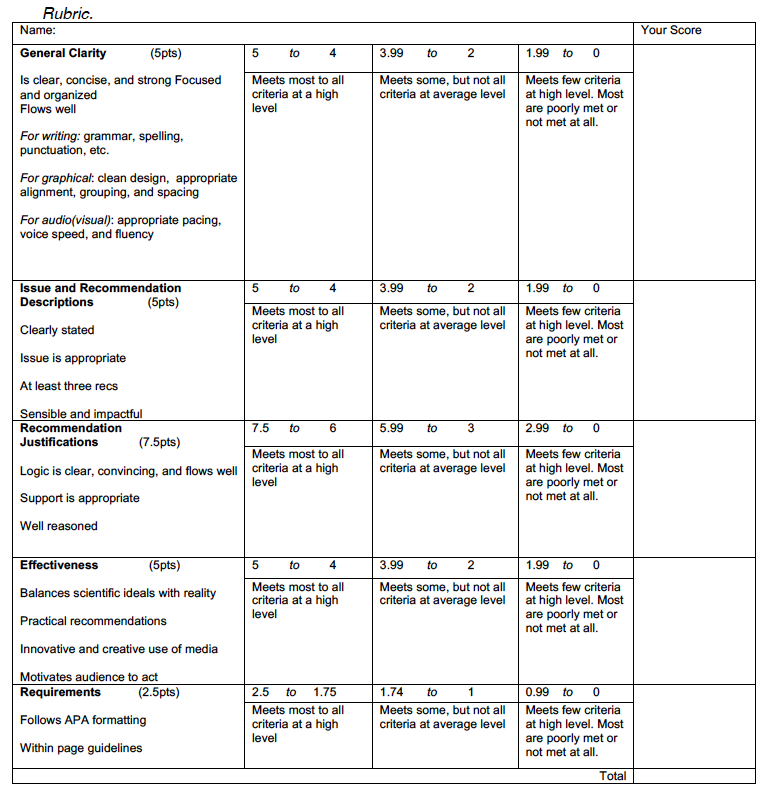Professor Joe Austerweil (Psychology 525: Cognition in health and society)
Task: The final project for the class is to conduct your own analysis of a societal/health issue and create a set of recommendations in some medium. The recommendations must be justified by evidence from peer-reviewed journal articles or book chapters, and the logic translating the published results to the recommendation must be communicated. The logic should convey the sociocognitive mechanisms by which the recommended intervention brings about the beneficial outcome. There should be at least three recommendations.
Audience: Your audience is an educated member of the Madison City Council (or Wisconsin State Government) that has commissioned you to create this product. She is not an expert in cognitive psychology, but is a former scientist. As such, she’ll want you to support your the recommendations with scientific evidence/logic. You must defend your recommendations with empirical support, laying out in detail how it specifically supports the particular recommendation.
Medium: The medium is open-ended. This includes a traditional paper, a brochure/booklet (similar to what someone might find in a doctor’s office), a poster, website or a video. You will have the same rubric regardless of the medium you use.
Paper: If you choose to do a paper, it should be five pages single-spaced (at least 1” margins and 11pt font). The references may go over onto a sixth page. Using less than the five pages is fine as long as you still complete the task (in fact, concise is better).
Other: If you choose to use a different medium, she expects it to be clear enough to inform any intelligent member of the public. It may be difficult to be clear to a layperson and defend your recommendations at the same time as laying out in detail how empirical research specifically supports each particular recommendation. In this case, you are encouraged to submit a 1-page paper (at least 1” margins 11pt font single-spaced) that provides the logic of how your recommendations are supported by empirical research.
In either case, please submit your materials through Canvas. Please do not include a title page (though your project should have a title).
Advice on scientific writing: Remain focused and brief. Don’t pad. Find everything you’d like to say and then cut half of it out. Every sentence should concern the thesis that you’re arguing for. If a paragraph or sentence or phrase or word could be removed without affecting the strength or flow of your argument, then remove it. Do your own research. Start with the class readings and the textbook, make use of me or your TA, and go to the library or writing center. Don’t feel you have to look at everything that’s been written on the topic, but your paper should reflect a thorough understanding of the major concerns in the literature. Don’t describe experimental results in full detail. Make clear what the nature of the experimental manipulation was and include the results relevant to your argument. Please do not use the word “prove” or “proof” unless it is the sense of a formal logic or mathematical proof.
I highly encourage using the different writing and research support centers on campus. For example, the Writing Center (http://writing.wisc.edu/) and the library http://researchguides.library.wisc.edu/c.php?g=178176.
Any quotes of more than a word or two from other people’s work should be so indicated and fully referenced. (You are discouraged from using long block quotes – you are being graded on your writing, not the quality of quotes you include in the paper). Any ideas that are derived from other people’s work should be referenced. Note this includes your own work. Self-plagiarism is still plagiarism, you may not submit the same work to this course that you previously submitted to a different course without prior approval from Professor Austerweil. You’re encouraged to make full use of other people’s efforts, just be clear that you’re doing so.
Late policy: Late assignments will be penalized for every 12 hours that it is late and with an escalating and cumulative penalty (which starts at 1 of the 25 points). So, you lose 1 point for turning in the paper within 12 hours of the deadline, you lose 3 points (1 for first 24 hours + 2 for second 24 hours) for within 24 hours, you lose 6 points for within 36 hours (1+2+3). Incompletes will be granted in exceptional circumstances. Please contact Professor Austerweil as soon as possible if you would like to take this option. If you ask after the due date and your request is granted, you will have a late penalty.
Cheating/Plagiarism policy: Plagiarism (including self-plagiarism), cheating, and academic dishonesty of any kind will not be tolerated. Any of the above will result in a grade of 0 on the assignment, could also affect your final grade in the course, and is likely to be reported to the administration.
